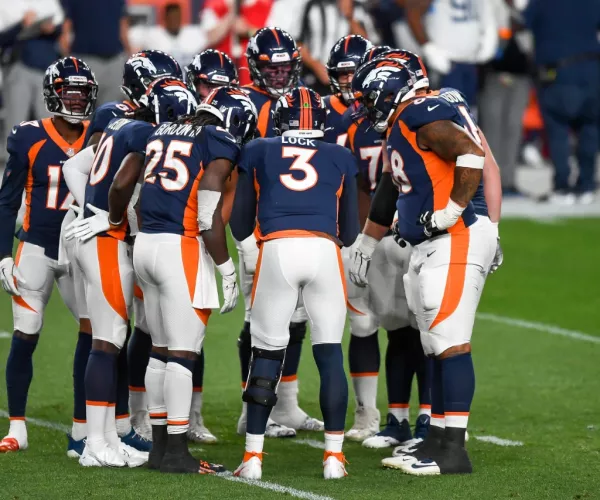
Denver Broncos

1959 Denver, CO
The founding of the Denver Broncos in 1960 as one of the original American Football League (AFL) teams ushered in an era that would challenge and ultimately transform the landscape of professional American soccer. The Broncos, established by minor league baseball owner Bob Howsam, debuted at a time of great experimentation and competition in the sport, with the AFL emerging as an alternative and later a competitor to the established National Football League (NFL).
Challenging Beginnings in the AFL
From the beginning, the Broncos faced significant challenges both on and off the field. Their inaugural victory over the Boston Patriots symbolized a promising start, but this initial success soon gave way to the reality of competitive difficulties. With a final record of 4-9-1 in their first season, the Broncos showed flashes of potential that nevertheless failed to translate into sustained success throughout the 1960s. Throughout the AFL's existence, the Broncos never managed a winning season, standing out as the team with the worst cumulative record among the league's founding members.
Financial Struggles and Threat of Relocation
Financial instability was a constant theme for the Broncos during their early years, with limited resources affecting everything from the quality of the team to the team itself, famously illustrated by the used uniforms they received from a defunct college soccer game. This precariousness almost resulted in the sale and relocation of the team in the mid-1960s, when a group of minority partners attempted to sell the franchise to interests in Atlanta. However, the last-minute intervention of the Phipps brothers, Gerald and Allan, who purchased the team and stadium, secured the Broncos' future in Denver. This act not only saved the franchise but also catalyzed an increase in season ticket sales, demonstrating the strong support of the local community for their team.
Building a Strong Foundation
Despite initial struggles, the Broncos' early years laid the foundation for future growth and success. Key figures such as Floyd Little, who joined the team in 1967, played a crucial role both on and off the field, contributing significantly to strengthening the team's relationship with its fan base and ensuring its permanence in Denver. The dedication and effort of Little and his teammates during these challenging years helped transform the perception of the Broncos from a struggling team to a symbol of perseverance and untapped potential.
The Denver Broncos of the 1960s are a reminder that even the most difficult beginnings can lead to successful futures. Through adversity, the franchise built an identity and a loyal fan base that would be instrumental in its rise to prominence in the decades that followed.
The transformation and rise of the Denver Broncos in the 1970s marks one of the most significant periods in franchise history, defining the path to success and competition at the highest level of the NFL.
The Beginning of the Transformation
The arrival of John Ralston as head coach in the early years of the decade marked the beginning of a profound change within the organization. Ralston, who had enjoyed success at the collegiate level, brought with him a new philosophy and approach to the team. Under his leadership, the Broncos achieved their first winning season in 1973, an accomplishment that symbolized the franchise's potential and the beginning of its rise in the NFL.
The "Orange Crush" Era
The real turning point for the Broncos came in 1977 with the arrival of Red Miller as head coach. Miller, along with the formidable "Orange Crush" defense, transformed the Broncos into legitimate title contenders. The "Orange Crush" defense, whose name was derived from the team's vibrant orange uniforms and popular soft drink, became synonymous with tenacity and toughness, dominating opponents and capturing the imagination of fans.
The First Super Bowl Trip
The 1977 season culminated with the Broncos reaching their first Super Bowl (XII) after an outstanding campaign with a 12-2 record and crucial playoff victories. Although the team ultimately fell to the Dallas Cowboys in the Super Bowl, this achievement was no less significant. It represented the culmination of years of effort and the beginning of an era in which the Broncos would be viewed as a dominant force in the league.
Legacy of Competitiveness
This period of transformation and success not only established the Broncos as a competitive team in the 1970s, but also laid the foundation for future success.This period of transformation and success not only established the Broncos as a competitive team in the 1970s, but also laid the foundation for future success, including multiple Super Bowl appearances and championship victories in the 1990s and beyond. The era of transformation and boom in the 1970s ushered in a legacy of excellence and competitiveness that would define the Denver Broncos for decades to come.
The evolution of the Denver Broncos during this era is a testament to the impact that visionary leadership and a cohesive team culture can have on athletic success. The "Orange Crush" era and the road to their first Super Bowl not only transformed the franchise, but also left an indelible mark on NFL history, inspiring generations of players, coaches and fans.
The Denver Broncos' establishment and legacy as one of the NFL's most iconic franchises has been built on decades of hard work, strategic vision and exceptional talent, both on and off the field. From cementing their competitiveness in the 1970s to Super Bowl victories in the decades since, the Broncos have set a standard of excellence and resilience.
The Golden Era of Elway and Davis
John Elway's arrival in 1983 ushered in one of the most successful eras in Broncos history. His on-field leadership and ability to orchestrate epic comebacks made him an iconic figure not only for the franchise, but for the entire sport. Alongside him, Terrell Davis emerged in the 1990s as one of the league's most dominant running backs, playing a crucial role in winning back-to-back Super Bowl championships in 1997 and 1998.
Pat Bowlen's Influence
Under the ownership of Pat Bowlen, who acquired the team in 1984, the Broncos enjoyed a period of unprecedented prosperity. Bowlen was instrumental in transforming the franchise into a model of success, both from an athletic and business standpoint. His commitment to excellence helped cement the Broncos' legacy as an NFL powerhouse, guiding the team to multiple Super Bowl appearances and cementing its status as a top-tier franchise.
The Peyton Manning Era
The arrival of Peyton Manning in 2012 ushered in a new chapter of success for the Broncos. With Manning at the helm, Denver became a consistent title contender, culminating in a Super Bowl 50 victory. Manning's ability to lead and his impact on and off the field reinforced the Broncos' winning culture, proving that the franchise could reinvent itself and stay on top through different eras and styles of play.
A Legacy of Excellence
The history of the Denver Broncos is a testament to the power of vision, leadership and talent. With eight AFC championships and three Super Bowl victories, the Broncos have left an indelible mark on the NFL. Beyond the trophies and records, the Broncos' legacy is reflected in the passion of their fan base, the dedication of their players and the organization's commitment to excellence. This legacy continues to inspire new generations on and off the field, keeping the Denver Broncos an enduring symbol of success in professional soccer.








































